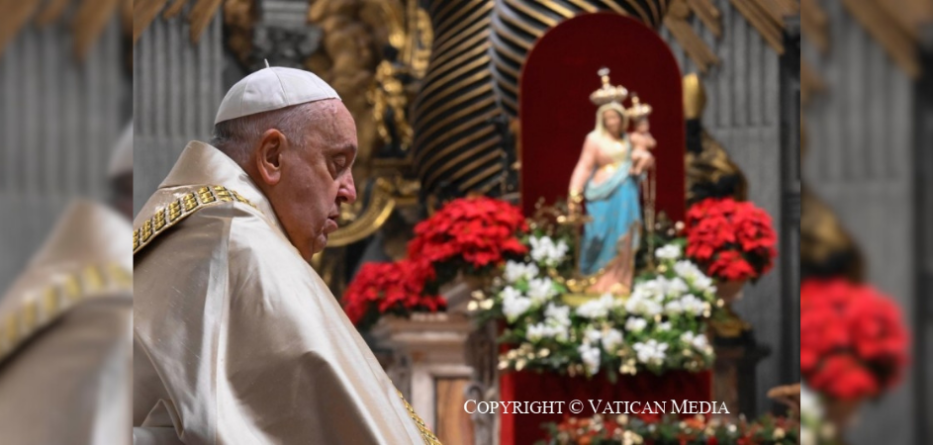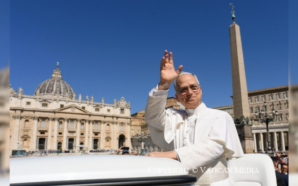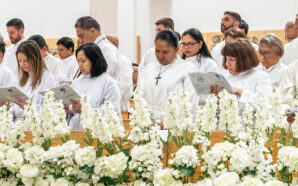For his last message of 2024, Pope Francis reflected on the ongoing work for the Jubilee that has begun. He celebrated the city of Rome, reinterpreting its “universal vocation” as a laboratory of fraternity.
Te Deum laudamus (We praise thee, O God). On December 31, shortly after 5 pm, following the singing of psalms and before the traditional Te Deum, Pope Francis delivered his final address of the year. “The year now ending has been very eventful for the city of Rome,” began its bishop from St. Peter’s Basilica. On December 24, he had opened the Holy Door, inaugurating the Jubilee of 2025, a gesture he repeated two days later in a Roman prison.
Seated in a chair at the foot of an immense column and wearing a vestment adorned with golden rectangles, Francis first acknowledged the “citizens, pilgrims, tourists, and all those passing through [Rome, who] experienced the typical phase preceding a Jubilee (…) with a multiplication of construction projects, both large and small.”
In recent months, many of Rome’s iconic monuments, from the Trevi Fountain to the statues on the Sant’Angelo Bridge and Piazza Navona, had been covered in scaffolding in preparation for the influx of pilgrims—estimated between 30 and 40 million for the Jubilee. Traffic conditions had slightly improved, and some projects, such as the pedestrian road construction in Piazza Pia, were completed on time. Others are expected to last several more months.
Pilgrims of fraternity
“This evening is a time for wise reflection, to consider that all this work, beyond its intrinsic value—provided it was performed under dignified conditions—had a meaning tied to Rome’s specific vocation, its universal vocation,” the pope said, speaking of the ancient imperial capital.
Francis elaborated on the contemporary relevance of this vocation, rooted in antiquity when Rome presided over an empire stretching from Scotland to the Danube, from Africa to the Middle East. In 2025, Rome is “called to welcome all people so they can recognize themselves as children of God and citizens of the earth,” he said, referencing Fratelli Tutti (All Brothers), his 2020 encyclical “on fraternity and social friendship.”
“It is good to think that our city, in recent months, has become a construction site for this purpose, with a global vision: preparing to welcome men and women from around the world—Catholics, Christians of other denominations, believers of all religions, seekers of truth, freedom, justice, and peace—all pilgrims of hope and fraternity,” the pope explained.
Every Wednesday and Sunday, Pope Francis persistently calls for peace in the Middle East, Ukraine, Myanmar, and beyond. During his Urbi et Orbi blessing on December 25, he mentioned no fewer than 18 countries experiencing conflict or severe humanitarian crises.
Fraternal humanity
The hope for a fraternal humanity is not “a rhetorical slogan,” an ideology, an economic project, or a technological endeavor, the pope affirmed on December 31. Above all, it is a spiritual project embodied in Christ, whom “the Holy Mother of God shows us,” he emphasized, on the feast of Mary, “Mother of God”—a title central to theological debates during the early Church councils.
“The hope for a fraternal world lies in Him, the Incarnate Son, sent by the Father so that we might all become what we are: children of the Father in heaven.” And thus, brothers, Francis insisted. He then looked up from his prepared text and delivered his final public words—outside of liturgy—for 2024: “Lord, bless us, forgive our sins, and give us the strength to move forward on our pilgrimage. Thank you.”
Reproduced with permission from La Croix International.








